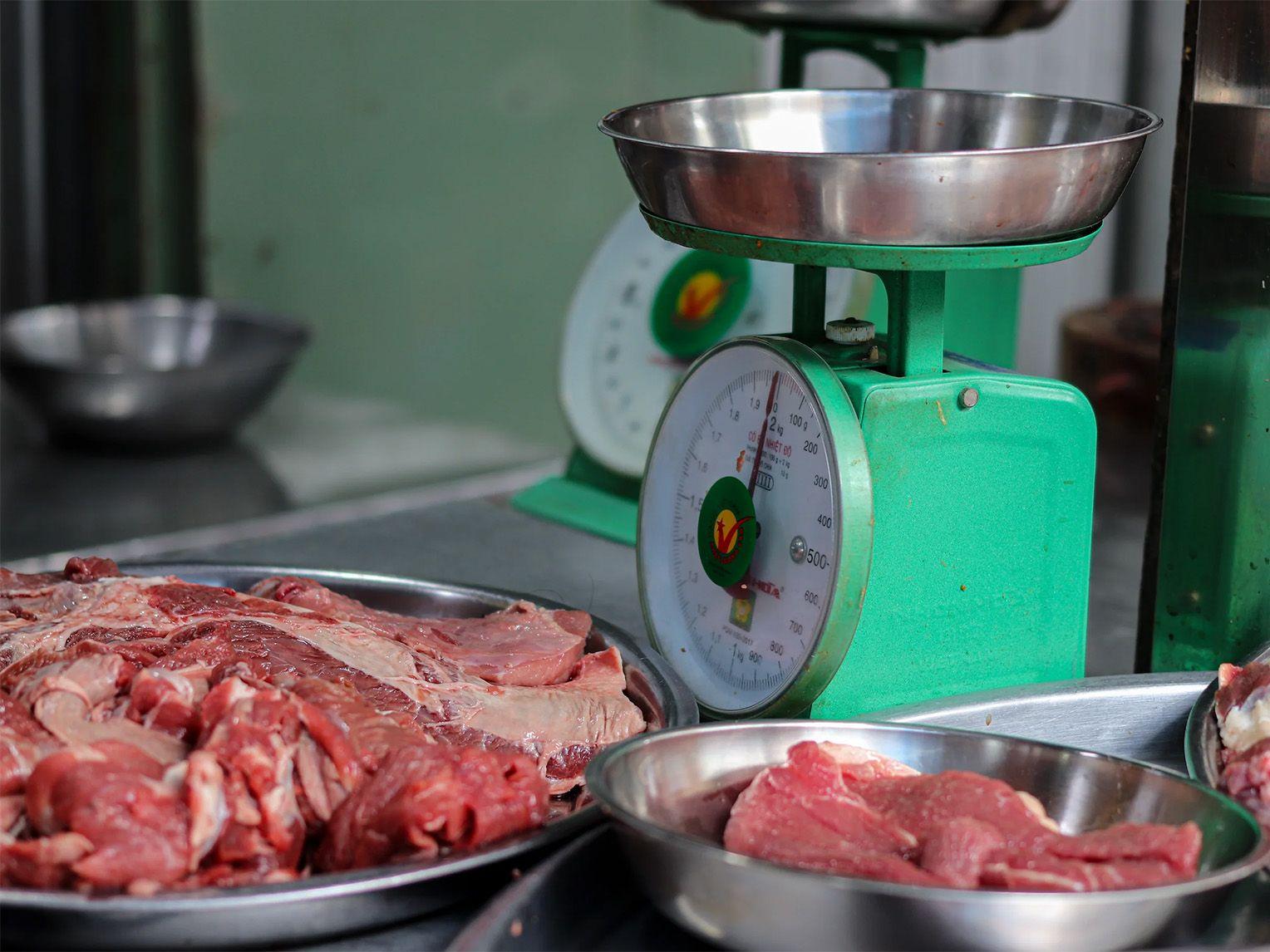Weight a Minute – Meat Fillers Are Stealing Your Money

When we buy meat at the grocery store, we’re charged by the pound. That’s fair. The more you get, the more expensive it should be…
But when meat processors engage in “plumping,” that’s different. It reminds me of the old image of butchers subtly placing a finger on the scale while weighing meat so they can charge more.
So, “What is meat “plumping?” Basically, it’s adding meat fillers with no nutritional value to add to the weight of your meat. Which raises what you pay at the checkout counter.
Those fillers may not negatively affect your health. But they certainly aren’t doing your bank account any favors.
What’s saltwater doing in my chicken?
Here’s one definition of plumping from Consumer Reports.
Plumped chicken commonly contains 15% of its total weight in saltwater. But in some cases it can contain as much as 30%.
The price of chicken is based on weight. So, opponents of this practice estimate that shoppers pay up to $1.70 more per package for added saltwater.
Sometimes injected into raw chicken meat is chicken stock, seaweed extract, or a combination of them.
This process brings the total annual cost to U.S families to an estimated $2 billion in added weight charges. I don’t know about you, but I find that rather disturbing.
Juicier & tastier… but more expensive
Companies that add fillers to chicken and other meats say the purpose is to make the meat juicier and tastier.
Kenneth McMillin is a professor of meat science at the Louisiana State University Agricultural Center in Baton Rouge.
He said these processors use multiple-needle injectors or vacuum tumblers. They force the sodium solution into the muscle.
Binding agents within the solution keep the added salt and water from leaching out of the meat while it is transported. As well as while it’s in grocery stores and while being cooked.

USDA

Bring on the sodium
Plumped chicken and other meats don’t just make your cost higher at checkout. They also have a higher sodium content than non-plumped meats.
Food experts say a serving of plumped chicken can contain between 200 and 500 milligrams of sodium.
Non-plumped chicken, on the other hand, usually contains in the range of 45 to 70 milligrams of sodium per serving.
Despite being plumped, chicken and other meats are still eligible to carry labels reading “All-Natural” and “100% Natural.”
Naturally occurring water
To be fair, poultry and other meats always contain some naturally occurring water. The muscle in lean cuts of meat can be composed of 75% water. The remaining 25% is protein, fat, carbohydrates, and minerals.
An eye of round roast contains 73% water on average prior to cooking. A whole broiler fryer contains 66% water before cooking.
As mentioned, some producers add saltwater and other fillers including flavor solutions. The law requires that they be stated on labels.
If a meat is labeled as “marinated,” it can contain no more than a 10% solution. With boneless poultry, it’s 8%. And with bone-in poultry it’s 3%.
3,000+ food additives?
According to the USDA, there are more than 3,000 substances used as food additives.
The most widely used ones include salt, sugar, and corn syrup. They are used for enhanced flavor, as well as a preservative.
Here’s how the Food and Drug Administration defines the term. A food additive is any substance that becomes a component or otherwise affects the characteristics of any food. Directly or indirectly.
This includes any substance used in the production or processing of food. As well as treatment, packaging, transportation, or storage.
Aim for organic
It’s very possible your grocery store carries chicken and other meats that have been plumped. If you wish to try to avoid plumped meat, look carefully at labels.
Watch for words such as “enhanced,” “plumped,” “broth added,” and “solution added.” And remember that seeing “natural” on a label does not mean it’s additive-free.
Labels containing any of the words or phrases below mean it’s more likely your meat will contain fewer additives. But there’s no guarantee.
- Organic
- Raised without antibiotics
- Farm-raised
- Pasture-raised
- Hormone-free
You may find it nearly impossible to locate chicken and other meats containing no additives. Including saltwater. In that case, choose the ones with the lowest percentage of additives.
Doing so will reduce the amount of sodium in your diet. And will very possibly result in less money spent at the store.
References:
- All testimonials in this advertisement are from real people; sometimes names and photos have been changed to protect their privacy and some were given free products in exchange for their honest feedback. Testimonials represent exceptional results, don't apply to the average purchaser and are not intended to guarantee that anyone will achieve the same results. The organizations, publications and people referenced on this site are not affiliated with 4Patriots. They have not endorsed, sponsored or recommended this product; no affiliation or endorsement is claimed. Terms & conditions apply. Cade Courtley is a former Navy SEAL and Platoon Commander who served 9 years of active duty and has been compensated by 4Patriots for his hard work in helping us test and endorse this product. Cade Courtley is a former Navy SEAL who served 9 years of active duty and has been compensated by 4Patriots for his hard work in helping us test and endorse products.
